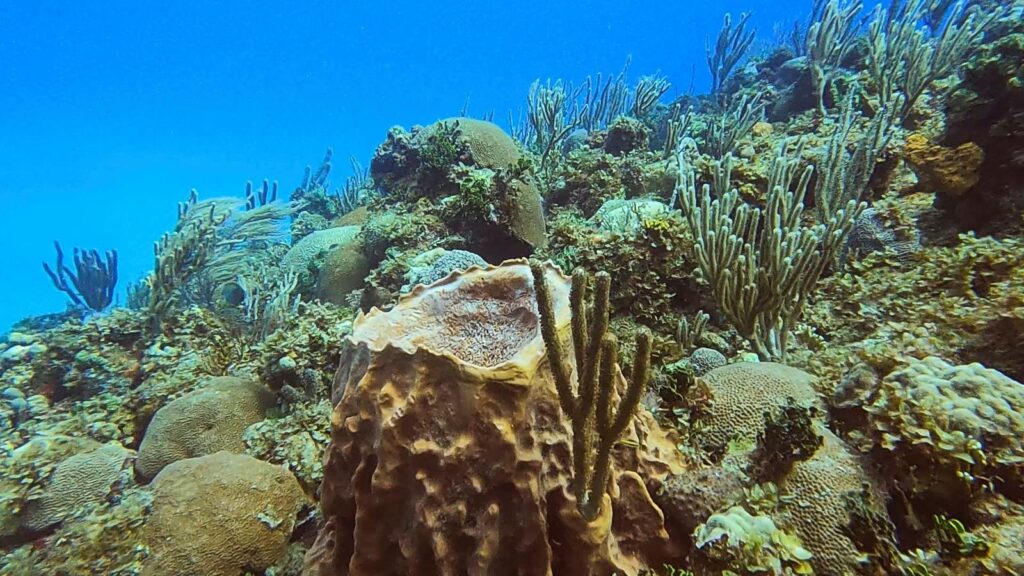Climate Change Shrinks Marine Life Richness Near Equator: Study
Apr 6, 2021 | Pratirodh Bureau
FILE PHOTO: A view of a coral colony on the coast of Havana, Cuba. Low oxygen conditions on coral reefs could increase by upto 287 per cent by the year 2100, relative to now. Researchers say hypoxia is likely to become more common as global temperatures continue to rise and marine heat waves become more frequent and severe
During some summers, as the Caribbean water temperatures climb, the luminous coral colonies of gold, green and blue that ring the island nation of Cuba give way to patches of skeletal white.
The technicolor streaks of darting tropical fish flash less frequently. The rasping sounds of lobsters go quiet.
While Cuba’s marine life has suffered from overfishing and pollution, there is mounting evidence that the warming of waters due to climate change may be taking a large toll as well — both off the island’s coast and globally.
Research published on Monday finds that the total number of open-water species declined by about half in the 40 years up to 2010 in tropical marine zones worldwide. During that time, sea surface temperatures in the tropics rose nearly 0.2 degree Celsius.
“Climate change is already impacting marine species diversity distribution,” with changes being more dramatic in the Northern Hemisphere where waters have warmed faster, said study co-author Chhaya Chaudhary, a bio-geographer at Goethe University.
While numerous factors like overfishing have impacted tropical species, the study published in the Proceedings of the National Academy of Sciences found a strong correlation between species decline and rising temperature.
Fish species diversity tended to either plateau or decline at or above 20C (68 Fahrenheit), the researchers found.
‘BLINK OF AN EYE’
While past studies have shown that ocean warming is driving some species to migrate to cooler waters, the new study attempts to gauge that impact more broadly — analyzing data on 48,661 marine species including fish, mollusks, birds and corals since 1955.
The dataset is a representative sample of 20% of all named open-water and seabed-dwelling marine species – like corals and sponges, researchers said.
The number of species attached to the seafloor remained somewhat stable in the tropics between the 1970s and 2010, according to the study. Some were also found beyond the tropics, suggesting they had expanded their ranges.
In other words, scientists say, species that can move are moving.
“In geological history, this has occurred in the blink of an eye,” said Sebastian Ferse, an ecologist at the Leibniz Centre for Tropical Marine Research who was not involved with the study. “To see such changes occurring so rapidly is something quite alarming.”
For fixed species like corals, moving is not an option.
“One of the big questions is ‘Will coral reefs as ecosystems and corals as species be able to move north or south enough fast enough to adjust to a changing climate?’” Ferse said.
CUBA’S CORALS
Having fleets of fish and other swimmers shift rapidly to more temperate waters could devastate the coral ecosystems they leave behind — along with any fishing and tourism industries that rely on them.
Such changes “can have a really huge impact on some of the most vulnerable human communities around the planet,” said Stuart Pimm, a conservation scientist at Duke University not involved in the study.
For Cuba, such an impact could unravel the island nation’s efforts to manage its underwater gardens although its corals have been less stressed by coastal development and pollution than corals elsewhere. They are considered more resilient to ocean warming.
“It’s impressive to return to an area that experienced significant bleaching the year before, but looks perfectly healthy a year later,” said Daniel Whittle, who heads the Caribbean program at the Environmental Defense Fund.
Cuba opened its first coral reef nursery four years ago to research which species coped best with warming and eventually to repopulate depleted reefs. The country is also restoring coastal mangroves, which serve as fish nurseries and shelter.
Chaudhary and her colleagues plan next to look at which tropical species were in decline or were migrating.
